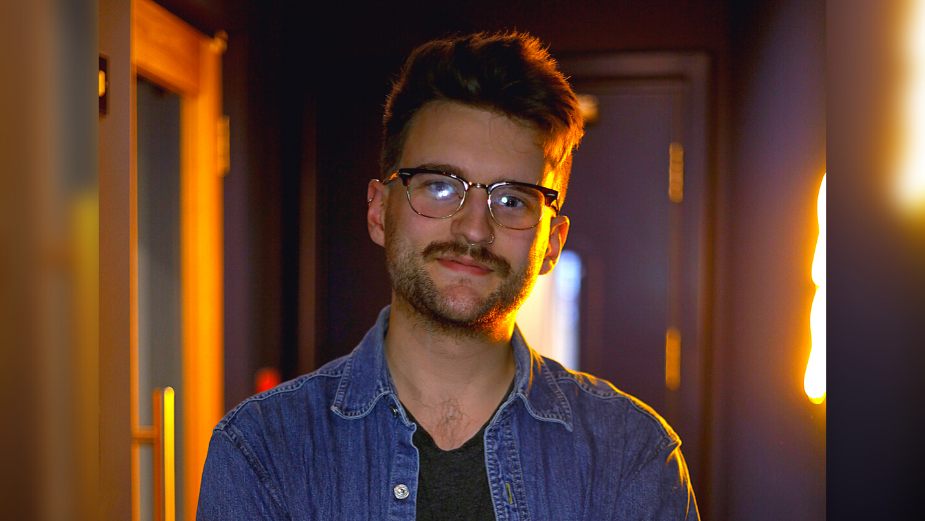
Thinking in Sound: Luke Isom

Growing up in an isolated hamlet in Hampshire, Luke Isom, sound engineer at Jungle Studios, found solace in music, working his way up to play over ten instruments. With his father previously a sound engineer in Soho during the 70s and 80s, Luke was introduced to audio’s more technical side and decided to follow the path of recording over playing.
After studying Music Production for Media in London, Luke worked his way into the industry as a runner, eventually taking on an engineer / sound design role at Jungle Studios. In this interview, Luke dives into his love of creativity in all forms, his favourite collaborations, and how his father’s brutally honest advice helped shape his career.
LBB> What’s your typical starting point when you’re working on a new project? How do you break it down and generate your ideas?
Luke Isom> So, I actually feel like I do this the wrong way round! I always jump to what the end product is going to be and then work backwards. When I get a brief, I can visualise how it’ll turn out and then I work out how to get there by developing the steps.
LBB> Music and sound are in some ways the most collaborative and interactive forms of creativity. Do you prefer to work solo or with a team?
Luke> I like to start out solo but then really appreciate the team’s input further down the line once I have achieved the initial vision. It’s good to get a fresh set of eyes and ears on what you've done. But for the beginning stages, where you’re experimenting, it can take a lot of explaining to clients that how it sounds at the moment is only temporary. So for that bit, it’s good to work solo until the piece is ready to be heard.
LBB> What are some of your most memorable professional collaborations?
Luke> I very recently collaborated with our creative director Ben Leeves on a spot for Skoda. This was pretty ground-breaking for me as it's the first BIG production I've been involved with. I created all the movement for the robots and Ben did the voices and everything else. This is a good example of creating something that doesn't really exist and getting to have a bit of freedom and artistic license on something that isn't bound by the laws of reality.
At Jungle, I also got to work with Vans - a dream brand for me due to a mix of my alternative music and skating background. It was just a voice record and mix but I was so happy the whole day. The brand was really complimentary of my work and I was taken aback by how nice they were so I was really pleased with the collaboration.
Then outside of work, around two years ago, myself, Sean Mahoney and Alex Wilson-Thame worked on a 40 minute short film project called Dogs of War which was a modern day version of a Shakespeare play, set in London with gangsters and stuff.
It was Alex’s idea and he was working on the sound and music for it but it was a lot to do so myself and Sean helped out on the sound design. We had a lot of fun with it, working on something so creative in our spare time.
LBB> What’s the most satisfying part of your job and why?
Luke> That feeling you get when you sign off on a big project! It’s such a rewarding feeling, and then it's really nice when you go back to look at the work after a little break and get to appreciate it properly. I especially love it when we get to go to a screening of the work.
And in terms of the creative process, I love making sounds for things that don't exist in real life as you're not bound to the rules of reality. You can add your own flair on it, which is really nice.
LBB> As the advertising industry changes, how do you think the role of music and sound is changing with it?
Luke> I'd say the expectations for standards have gone up. The younger generation of producers seem to have their head around sound and music a lot more now and have very high expectations of what they want their ideas to sound like. It's actually really helpful when you work with a producer who understands it so well.
LBB> Who are your musical or audio heroes and why?
Luke> Music-wise, I love the Icelandic composer Jóhann Jóhannsson. He does a lot of film scores, and his sound always feels quite natural. He also does some really wacky stuff - I heard that for one of his films he got ten double bass players, where you’d normally have three, to sit in a circle and play one long note which is super ominous and must sound really strange and overwhelming but in a way that moves you.
Then sound design-wise there’s the classic Ben Burtt who did the original Star Wars and Star Trek remake sounds. He has quite an interesting way of looking at things. For Star Wars, he only used things that exist on our planet to make the sounds, but for Star Trek he went down a different route - it was all very musical and the buttons on the ship were the sounds of synthesisers.
My dad is also a sound designer, and I’ve always valued his opinion because he’s just so brutal! Now that I have more experience, he's a lot nicer. But when I was a teenager and the quality of my work wasn’t quite up to scratch yet, he didn’t hold back on being really honest with me but it’s been really helpful. I learnt a lot of lessons from him that I still go by today.
LBB> Do you have a collection of music/sounds and what shape does it take?
Luke> I have a little handheld recorder. I was walking home the other day and there was a big metal bin that I kicked for no reason but it made a really great sound. So I went home and got my recorder and took it back to the bin to collect the sound it made. I just record random little things. The amount of them that have actually seen any use though is a different story.
I also love to record sound for memory purposes. When my parents moved out of our family home, which was in the middle of nowhere next to a forest, I recorded the distinct sounds of the different birds and wildlife there. It’s nice to have an audio memory of it.
And this may shock you but I was really late to the game with Spotify - I only got it last year. Before then I had an iPod Classic from 2004 but it got to the point where I filled it up so much I had to buy a new memory card for some more storage. And then it kept dying and I would have to buy another iPod to take apart and give my old one the new parts. After the third time I realised that this isn't sustainable. So I got Spotify and I was like, what have I been doing all this time!
LBB> When you’re working on something that isn’t directly sound design or music, are you the sort of person who needs music and noise in the background or is that completely distracting to you?
Luke> I can't work without music in the background. I fall asleep listening to an audio book, I'm one of those people. When I’m working I like to have the sound of the TV in the background for a bit of white noise.
There’s actually a strange thing I do when I’ve nearly completed a mix, where I turn my computer screen off, turn the TV on, and then hit play and look away. So then basically I don't have any live visual stimuli from the programme and I have some background noise which helps me pinpoint whether my mix sounds natural. Because if a sound really stands out to me among the background noise of the TV, then I know it’s probably way off.
LBB> What about sound on your travels - have you ever recorded soundscapes in different places?
Luke> I’m blown away by how different cities can sound. I don't know why but the sound of European police sirens makes me really happy. But a city that really stood out to me was New York. We got a train out of the city to this beautiful sandy beach which you don’t expect in New York. It was surreal to be somewhere like that juxtaposed with the bustling city right next to it.
LBB> If you had to travel somewhere purely for its soundscape, where would you choose to go?
Luke> Vietnam, I reckon. I imagine it to be quite otherworldly and that the wildlife would sound so different. I can imagine the sound of the Vespas. It’d be very audibly different to the UK I think.
LBB> Outside of the music and sound world, what sort of art or topics really excite you and do you ever relate that back to music?
Luke> I enjoy photography and graphic design as a hobby. I sometimes do band photography at live events and I’ve done several graphic spreads for a friend that runs a music magazine called Spilt Milk.
I also like carpentry. I am a very amateur carpenter but I built my desk and headphones stand - I like doing practical things. I want to get into pottery next. My mum used to take me along to pottery classes when I was younger and we even had a kiln in the house. It's just really refreshing to have these different creative outlets to enjoy and it's a nice way to wind down.
LBB> How has your relationship with sound and music changed over the years?
Luke> I remember my first music technology class at college and my teacher saying to us that you'll never be able to stop analysing sound ever again. And it’s really true. I have never listened to music in the same way again. I'll always wonder how it’s been made and analyse what I hear, whereas before I’d just listen to music. Now, I listen to the production of music.
Over the past ten years I’ve also become a lot more relaxed when I listen back to my own work. When I didn’t have the experience, I would over analyse every sound for hours. Now, I am a lot more accustomed to what sounds good and what doesn't. So I've become a lot more relaxed with myself. I can listen to something once and do one round of tweaks and be happy with it.













